Module 7 Time off Unit 3 Language in use教案 (外研版八年级下)
七年级英语上册 Module 7 Unit 3 Language in use教案 (新版)外研版
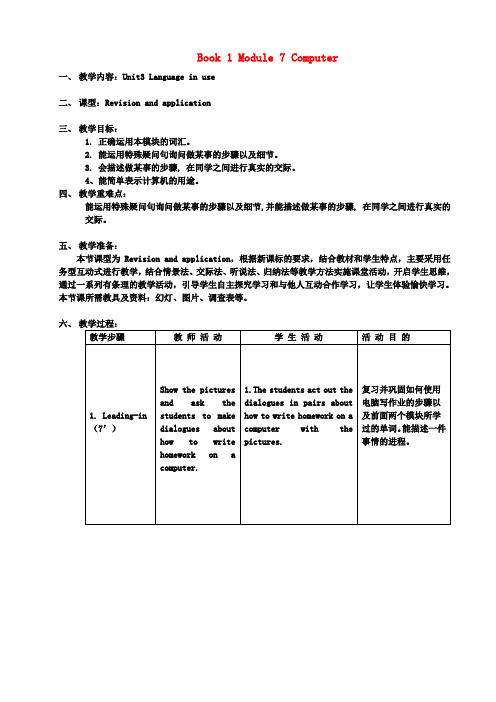
Book 1 Module 7 Computer一、教学内容:Unit3 Language in use二、课型:Revision and application三、教学目标:1. 正确运用本模块的词汇。
2. 能运用特殊疑问句询问做某事的步骤以及细节。
3. 会描述做某事的步骤, 在同学之间进行真实的交际。
4、能简单表示计算机的用途。
四、教学重难点:能运用特殊疑问句询问做某事的步骤以及细节,并能描述做某事的步骤, 在同学之间进行真实的交际。
五、教学准备:本节课型为Revision and application,根据新课标的要求,结合教材和学生特点,主要采用任务型互动式进行教学,结合情景法、交际法、听说法、归纳法等教学方法实施课堂活动,开启学生思维,通过一系列有条理的教学活动,引导学生自主探究学习和与他人互动合作学习,让学生体验愉快学习。
本节课所需教具及资料:幻灯、图片、调查表等。
六、达标训练题一.按要求改写句子。
1. Tom sends three emails to his teacher.(对划线部分提问)2. Jim plays games on his computer. (变否定句)3.Lucy usually buys a ticket on the Internet. (对划线部分提问)4.Mr. Wang uses his computer in the evening. (对划线部分提问)5.She often does her homework on the computer. (变一般疑问句) 二.按要求完成句子。
1.我经常上网搜索信息。
I often ________ _______ ________ on the Internet.2.你通常怎样制定旅游计划。
How do you usually _______ _________ _________?3.请打开电脑。
Please ___________ __________ the computer.4.我没有时间去买票。
八年级英语下册《Module 7 Time off Unit 3 Language in use 》课件 外研版
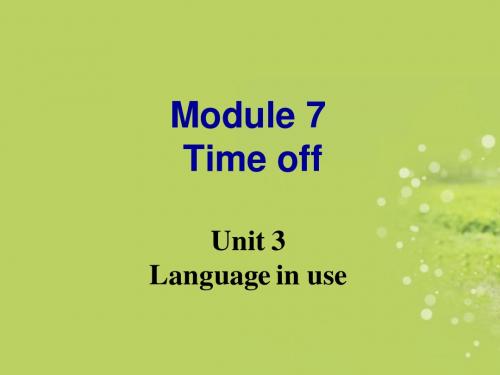
4) Daming said, “Everyone is cheering now.” Daming said (that) everyone was cheering then __________________________________. 5) Tony said, “It’s very noisy here!” Tony said ___________________________. (that) it was very noisy here 6) Tony asked Daming, “Have you got your camera with you?” Tony asked Daming, ________________________________. if he had got his camera with him 7) Becky said, “Be quiet.” to be quiet Becky told us _____________.
Learn to do 练练吧
Mrs. Styles said to Sally, “Please don’t worry.”
Mrs. Styles told Sally not to worry. Betty said, “Don’t be late.” Betty ____ us ____ to be late. told not
Grammar
直接引语和间接引语(2)
祈使句的转述
如果转述的是祈使句, 变成间接引语时一般转换 为 tell / ask sb to do sth 这样的结构, 根据祈使 句所表示的语气可以选择适当的谓语动词。
1. 如果直接引语中含有please, 间接引语中 谓语动词一般使用ask等表示要求的单词。 He said to Daming, “ Please bring some food.” He asked Daming to bring some food.
外研版七年级上册Module 7 Computers Unit 3 Language in use.

外研版七年级上册Module 7 Computers Unit 3 Language in use.教案课文标题Module 7 Computers单元名称Unit3 Language in use教材版本外研社授课年级七年级上授课教师一.课型:Revision and expansion二、教材分析1、话题内容:本模块是外研版七年级上册第七模块,以“Computers”为话题来展开学习的。
因为许多农村的学生对于计算机的应用可能还不是很了解。
因此,本模块首先具有普及计算机基本知识的功能。
除了呈现与计算机相关的语言知识外,还涉及到如何正确使用计算机。
2、语言项目:本单元涉及的语言知识是一般现在时的特殊疑问句。
3、在本模块中的作用和地位:本节课是第三单元,属于复习课,主要复习第一和第二单元的重点知识以及拓展语法练习三.学情分析本节课的授课对象是普通中学初一年级的学生,大部分学生学习热情高,有参与学习的主动性和积极性,喜欢合作学习,但是学习能力还需要教师在学习过程中逐步培养。
学生已经完成对本模块所有单词以及Unit1和Unit2的学习,为学生在本课的学习奠定了一定的语言基础。
但综合语言运用能力还需进一步提高。
四、学习目标分析(一)语言知识目标1. 话题:computers2. 语音:能识别并正确朗读/au/ /eu/ /f/ /v/。
3. 词汇:理解和领悟以下词汇在本课中的意义并学会运用。
名词:Internet ticket music information email keyboard mouse screen document travel movie customer动词:click save print share check plan search send4. 语法:一般现在时的特殊疑问句。
5. 功能:能够谈论电脑的操作方法,发出操作指令。
(二)语言技能目标1. 能听懂与电脑相关的连续指令和有关电脑的简单询问。
Module 7 Unit 3 Language in use 教学设计外研版七年级英语上册

七年级英语上册Module 7 Unit 3 Language in use.P1 Hello, everyone! I’m very happy to have this lesson with all of you. Today we will go over Unit 1 and Unit 2 of Module 7 as well as finish tasks in Unit 3. Are you ready? OK. Let’s begin our class.P2 (Step 1: Analysis of the material)首先来看看本节课我们将学到什么内容。
(点)P3 本节课是一节复习及拓展课。
通过本课的学习,我们的目标是:1.复习本模块的重点短语、句型;2.总结和巩固行为动词的一般现在时的特殊疑问句;3.了解计算机的发展史,巩固与计算机相关的语言知识;树立对待电脑和网络的正确态度。
(点)P4 我们从一小段对话来开始本课的学习,我们一起来看(点)P5 Read the conversation and pay attention to the blue words.(点)---Hi, I’m Betty. What’s your name? (点)---I’m Daming. Welcome to Beijing. Where do you come from?(点)---I come from America. (点)---How do you go to school every day? (点)---I go to school by bike.在这个小对话中,蓝色字标出的what,where和how都是特殊疑问词, 用来引导特殊疑问句。
本模块在语法上要求大家掌握行为动词的一般现在时的特殊疑问句。
(点)P6. Let’s look at the key sentences in this module. They are:How do I write my homework on the computer?What do I do next?Where do I write the name? (点)P7 通过上一模块的学习,我们了解了如何询问某人是否经常做某事。
Module7 Unit3 Language in use (1)
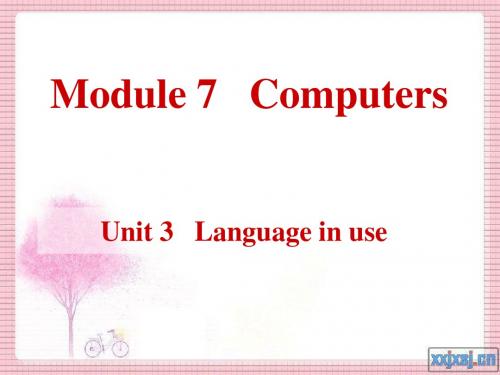
问词,疑问词有who (谁), what (什么东西),
where (什么地方), which (哪一个), when /
what time (什么时间), how (如何), how
many (多少)等。一般来说,特殊疑问句的
结构为“疑问词+ 一般疑问句?”。如:
(询问人) (询问地点)
注意:特殊疑问句不能用yes或no来回答, 而应根据它所询问的内容直接作答。 e.g.:
1.Match the questions with the answers. Where do you save your homework? When do you use a computer? How many emails do you write every week? I write to my friends. I save my homework in a document. I use my computer after school. I write three or four emails.
3. — ________________ When does she use her computer?
— She uses her computer every Sunday.
Who do you write emails to? 4. — ________________ — I write emails to my friends.
3. Daming ______________ doesn’t use (not use) a computer to do his homework, but he uses it to play __________ (play) music. 4. She ____________ (make) travel plans on make the Internet, but she ____________ doesn’t buy (not buy) tickets. 5. We _____________ doesn’t have (not have) a computer at use home, but we _________ (use) the computer at school.
Module 7 Unit 3 Language in use教案(含教学反思)
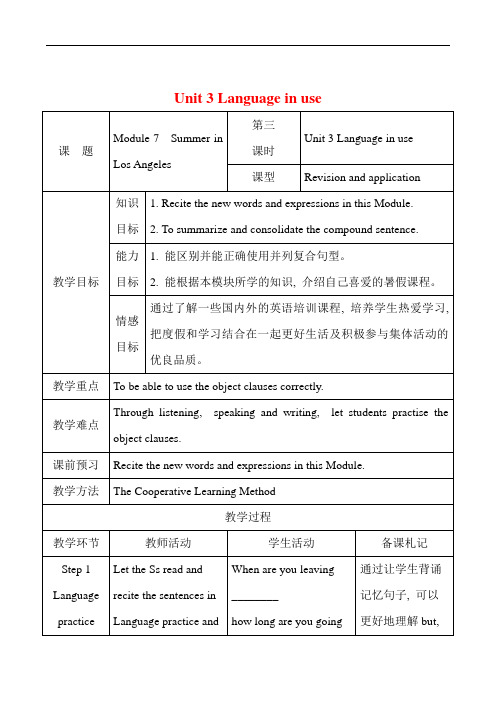
Step 2
Free talk
1. Have a free talk with students.
Summer holiday is coming. Where are you going?
2. Play a game.
Have the students make sentences with“but, and, or”one by one about travelling in groups .
5. Complete the conversation with the words and expressions in the box. (Activity 6)
6. Have the students listen to the tape and answer the questions. (Activity 7) Then call back the answers.
5. Complete the conversation with the words and expressions in the box. (Activity 6)
6. Listen and answer the questions. (Activity 7) Then check the answers.
教学重点
To be able to use the object clauses correctly.
教学难点
Through listening, speaking and writing, let students practise the object clauses.
课前预习
2019秋外研版七年级英语上册教案:Module7Unit3 Languageinuse

1.理论介绍:首先,我们要了解一般现在时态和描述天气的词汇。一般现在时态是用来描述习惯性动作或永恒真理的时态,它在日常交流中非常重要。描述天气的词汇则是我们表达天气状况的基础。
2.案例分析:接下来,我们来看一个具体的案例。这个案例展示了如何用一般现在时态和天气词汇来描述不同天气下的活动。
2.教学难点
(1)第三人称单数动词变化的掌握:学生容易混淆动词在第三人称单数时态下的变化规则。
-举例:教师需通过具体例句、练习题等方式,帮助学生掌握动词变化规则,如“play”变为“plays”。
(2)一般现在时态的运用:学生在实际对话中可能无法熟练运用一般现在时态描述天气和日常活动。
-举例:教师可组织角色扮演活动,让学生在实际情境中练习并运用一般现在时态。
(3)词汇在实际对话中的应用:学生在对话中可能无法灵活运用所学词汇描述天气和日常活动。
-举例:教师可通过小组讨论、情景模拟等方式,引导学生将词汇应用到实际对话中。
(4)跨文化交际意识:学生在了解中西方天气描述文化差异时,可能存在理解困难。
-举例:教师可通过展示中西方关于天气的描述实例,帮助学生了解文化差异,提高跨文化交际能力。
4.学习和练习教材中的Activity 3,掌握如何用英语询问和描述人们的日常活动,如:What do you usually do when it's sunny/rainy?
5.结合教材中的Activity 4,学生进行角色扮演,模拟真实场景,运用所学知识进行英语对话。
二、核心素养目标
本节课的核心素养目标主要包括:
其次,在实践活动过程中,我发现有些学生对于词汇的运用还不够灵活。这可能是因为他们在学习过程中缺乏足够的实践机会。为了改善这一状况,我计划在接下来的课程中增加更多情景模拟和角色扮演活动,让学生在实际语境中更好地运用所学词汇。
外研版七年级英语上册教案:Module7Unit3Languageinuse

教学内容与课本紧密关联,旨在帮助学生巩固所学知识,提高英语实际运用能力。
二、核心素养目标
1.提升学生英语语言能力:通过学习本节课内容,使学生能够熟练运用一般现在时和现在进行时描述日常活动和正在进行的动作,提高学生的英语表达和沟通能力。
2.培养学生的跨文化交际意识:让学生在掌握目标语言的基础上,了解并尊重不同文化背景下的日常活动差异,提升学生的国际视野。
外研版七年级英语上册教案:Module7 Unit 3 Language in use
一、教学内容
外研版七年级英语上册教案:Module 7 Unit 3 Language in use
本节课主要围绕Module 7 Unit 3 Language in use展开,内容包括:
1.复习和巩固一般现在时和现在进行时的用法。
(二)新课讲授(用时10分钟)
1.理论介绍:首先,我们要了解一般现在时和现在进行时的基本概念。一般现在时用于描述习惯性动作或经常发生的事情,而现在进行时则用于描述说话时正在进行的动作。了解这两个时态对于准确表达非常重要。
2.案例分析:接下来,我们通过一个具体的案例来展示这两个时态在实际中的应用。案例中的人物正在做不同的事情,我们将学习如何正确使用时态来描述这些动作。
3.重点难点解析:在讲授过程中,我会特别强调一般现在时和现在进行时的区别,以及如何正确变换句型和动词形式。对于难点部分,我会通过对比和实际例子来帮助大家理解。
(三)实践活动(用时10分钟)
1.分组讨论:学生们将分成若干小组,每组讨论一个与描述正在进行的动作相关的实际问题。
2.实验操作:为了加深理解,我们将进行一个简单的角色扮演活动。学生们将模拟不同的场景,用英语描述正在进行的动作。
八年级英语下册 Module 7 Time off Unit 3 Language i
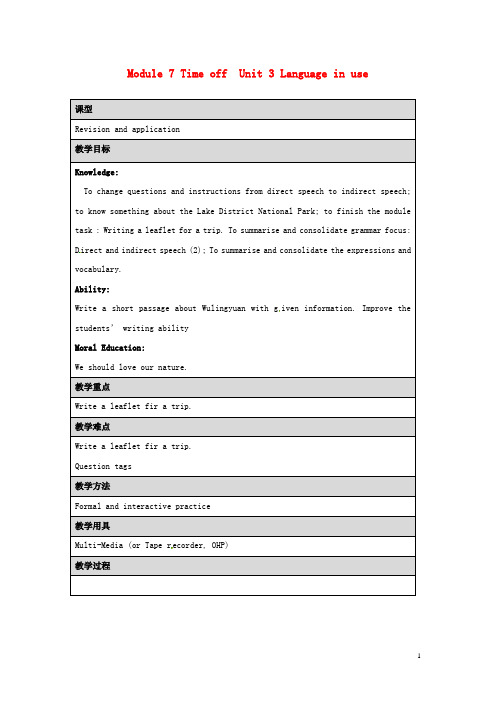
Module 7 Time off Unit 3 Language in use课型Revision and application教学目标Knowledge:To change questions and instructions from direct speech to indirect speech; to know something about the Lake District National Park; to finish the module task : Writing a leaflet for a trip. To summarise and consolidate grammar focus: D irect and indirect speech (2); To summarise and consolidate the expressions and vocabulary.Ability:Write a short passage about Wulingyuan with g iven information. Improve the student s’ writing abilityMoral Education:We should love our nature.教学重点Write a leaflet fir a trip.教学难点Write a leaflet fir a trip.Question tags教学方法Formal and interactive practice教学用具Multi-Media (or Tape r ecorder, OHP)教学过程Step 1 RevisionHelp students to revise what was learnt in 3 periods of this module. Step 2 Language practiceTask1:To summarise and consolidate the usage of direct and indirect speech (2) Directions(1).Run through the examples with the Ss. and make sure that they are familiar with the use ofdirect and indirect speech (2).(2). Ask the Ss. to repeat the sentences in the box.(3). Ask ”Can you make other similar examples?”(4).Focus the Ss’s attention on the ways in which they are formed.Task2 : To consolidate direct and indirect speech (2):(1). Do activity 1 and 2 on page 60. Grasp the use of the structure:(2). Ask the Ss. to call out the answers from the whole class.(3). Ask the Ss. to read the complete sentences.Task 3 : Practise the conversations in Activity 3.Directions:(1). Ask the Ss. to work in pairs to practise the conversations.(2) Circulate and monitor their production, paying particular attention to direct and indirect speech (2).Step 3 Revise the words that we learned in this module:Task 1 : Choose the correct word to complete the sentences.Directions1.Explain the rules to the Ss and ensure that the Ss. Know what to doLet the Ss read through the words and sentences.2.Ask the Ss to do the activity individually. Then check with a partner.3.Collect the answers.Task 2 : Complete the passage with th e correct form of the words in the box. Directions1.Let the Ss read through the passage.2.Ask the Ss to do the activity individually. Then check with a partner.3.Collect the answers.Task 3 :.Have a dictation. Let the Ss hand in immediately.Directions1.Explain the rules to the Ss and ensure that the Ss. Kno w what to do2.Let the Ss write the words the teacher read.3. Let the Ss hand in immediately.Step 4 Listen and answer the questions.Directions1.Let the Ss r ead through the questions in activity 6 on page 62.2. Play the tape while they just listen and focus.3 Play the tape again for them to complete, correct and check.4. Then check with a partner.5. Collect the answers having one student ask a question and another answer. Step 5 Writing1.Task: Write a short passage about Wulingyuan with given information Directions1) Run through the information with the Ss. in activity 6 on page 59 and makesure that they understand them.2)Ask the Ss to read and use the notes given. And write about it individuallyand then check with a friend.3)Call back a few examples from the whole class.4)Then summariseStep 6 Around the worldTask: Learn something about the Lake District National Park.Directions:1. Ask the Ss.to look at the different pictures about the Lake District National Park.Tell the Ss. some knowledge about them.2. Read the text and answer any questions the Ss have.Step 7 Module TaskWrite a leaflet fir a trip.Directions:1.Activities 8 and 9 on page 63. Ask the Ss. to think about an adventureholiday.2.Ask them to work in pairs to ask and answer the questions.3. Write a leaflet about the holiday. Circulate and monitor their production.4. Ask som e Ss to read their leaflet. Give comments and encourag e them.Step 8 A testDo activity 7 on page 62 in the WB. Let’s see who can finish it as soon as possible.Step 9 Homework.Finish all the exercises in the WB.。
七年级英语上册 Module 7 Computers Unit 3 Language in use(第1课时)教案 (新版)外研版
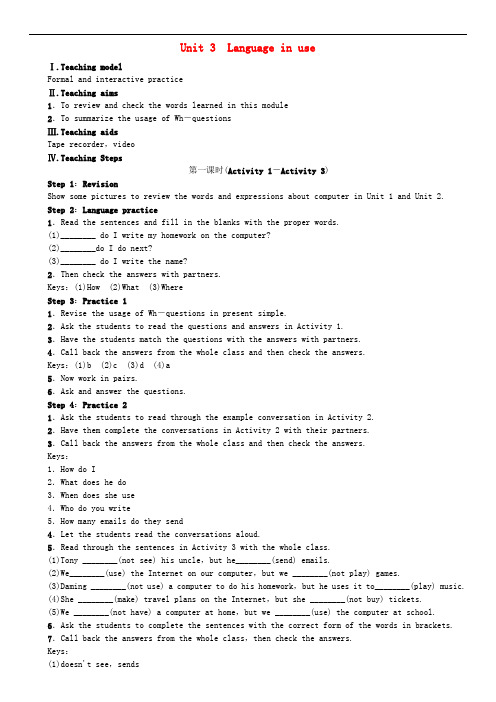
Unit 3 Language in useⅠ.Teaching modelFormal and interactive practiceⅡ.Teaching aims1.To review and check the words learned in this module2.To summarize the usage of Wh-questionsⅢ.Teaching aidsTape recorder,videoⅣ.Teaching Steps第一课时(Activity 1-Activity 3)Step 1:RevisionShow some pictures to review the words and expressions about computer in Unit 1 and Unit 2. Step 2:Language practice1.Read the sentences and fill in the blanks with the proper words.(1)________ do I write my homework on the computer?(2)________do I do next?(3)________ do I write the name?2.Then check the answers with partners.Keys:(1)How (2)What (3)WhereStep 3:Practice 11.Revise the usage of Wh-questions in present simple.2.Ask the students to read the questions and answers in Activity 1.3.Have the students match the questions with the answers with partners.4.Call back the answers from the whole class and then check the answers.Keys:(1)b (2)c (3)d (4)a5.Now work in pairs.6.Ask and answer the questions.Step 4:Practice 21.Ask the students to read through the example conversation in Activity 2.2.Have them complete the conversations in Activity 2 with their partners.3.Call back the answers from the whole class and then check the answers.Keys:1.How do I2.What does he do3.When does she use4.Who do you write5.How many emails do they send4.Let the students read the conversations aloud.5.Read through the sentences in Activity 3 with the whole class.(1)Tony ________(not see) his uncle,but he________(send) emails.(2)We________(use) the Internet on our computer,but we ________(not play) games.(3)Daming ________(not use) a computer to do his homework,but he uses it to________(play) music.(4)She ________(make) travel plans on the Internet,but she ________(not buy) tickets.(5)We ________(not have) a computer at home,but we ________(use) the computer at school. 6.Ask the students to complete the sentences with the correct form of the words in brackets. 7.Call back the answers from the whole class,then check the answers.Keys:(1)doesn't see,sends(2)use,don't play(3)doesn't use,play(4)makes,doesn't buy(5)don't have,use8.Read the sentences together loudly.Step 5:Homework1.Revise all the key points in this module.2.Finish the workbook.Blackboard DesignUnit 3 Language in use(Activity 1-Activity 3) 1.How do I write my homework on the computer?2.What do I do next?3.Where do I write the name?。
七年级英语上册 Module 7 Computers Unit 3 Language in use(第2课时)教案 (新版)外研版

Unit 3 Language in use第二课时(Activity 4-Activity 7)Step 1:ReviewReview the present simple tense.Step 2:Practice1.Have students read through the words and the sentences in Activity 4.2.Ask students to complete the sentences with the correct form of the words from the box.check,like,plan,talk,use(1)Tom ________ his email every Saturday.(2)I have a computer,but I don't ________ it.(3)Come to my office.Let's ________ for our holiday.(4)My mother doesn't ________ computer games.(5)I can ________ to my friends on the Internet.3.Call back the answers from the whole class,and check the answers.Keys:(1)checks (2)use (3)plan (4)like (5)talk4.Have students read the sentences aloud.Step 3:Around the worldThe first computer1.Get students to read this passage.Before reading,teach the key words and phrases.2.Then ask a few students to read it,and translate it into Chinese at last.3.Solve the problems which the students met in reading.4.Read the passage together.Step 4:Module taskMaking a survey about computers1.Work in groups of three.Write questions about students and computers.2.3.Work with the whole class.Ask and answer questions in Activity 5,and make notes.4.Work in your group.Make a survey about students and e the notes you made in Activity 6 to help you.Seven students each have a computer at home.Five students each use a computer for the ir homework…Step 5:Homework1.Finish the writing.2.Revise the whole module.Blackboard DesignUnit 3Language in use (Activity 4-Activity 7)check use plan like talk1。
- 1、下载文档前请自行甄别文档内容的完整性,平台不提供额外的编辑、内容补充、找答案等附加服务。
- 2、"仅部分预览"的文档,不可在线预览部分如存在完整性等问题,可反馈申请退款(可完整预览的文档不适用该条件!)。
- 3、如文档侵犯您的权益,请联系客服反馈,我们会尽快为您处理(人工客服工作时间:9:00-18:30)。
Module 7 Time off Unit 3 Language in use教案 (外研版八年级
下)
Step 1 Greeting, check students’ homework
Step 2 Revision and leading in
1. Review Grammar: Direct Speech and Indirect Speech
Step 3 Language practice
1. Do P60-Ex1.
Complete the sentences. Change those sentences into Indirect Speech
2. Do P60-Ex 2.
Write what Sally and her teacher said or Tony and his father said. Change those sentences into Direct Speech.
3. Pairs work. Do P61-Ex 3.
Retell the conversation to another student. And let some students read
their
answers in whole class.
4. Do P61-Ex 4.
Contrast the two words, and choose a correct one to complete these sentences.
Let students read their sentences in pairs.
5. Group work. Do P62-Ex 5.
Know the meaning of the words in the box Read through the passage, and know
the main idea. Complete the passage with the correct form of the words in
the box.
Step 4 Summary
1. Review the important language points of today.
2. Do some exercises of the workbook exercises.
Step 5 Homework
1. Review the grammar and other important points of today.
2. Prepare sth. about “the Lake District National Park” (pictures or film).
3. Finish off the workbook exercises.
Writing on blackboard
Students’ important answers:
1. 2.
3. 4.
Important language points:
1. 2.
3. 4.
Some new words or useful expressions
1.
2.
3.
4.。
